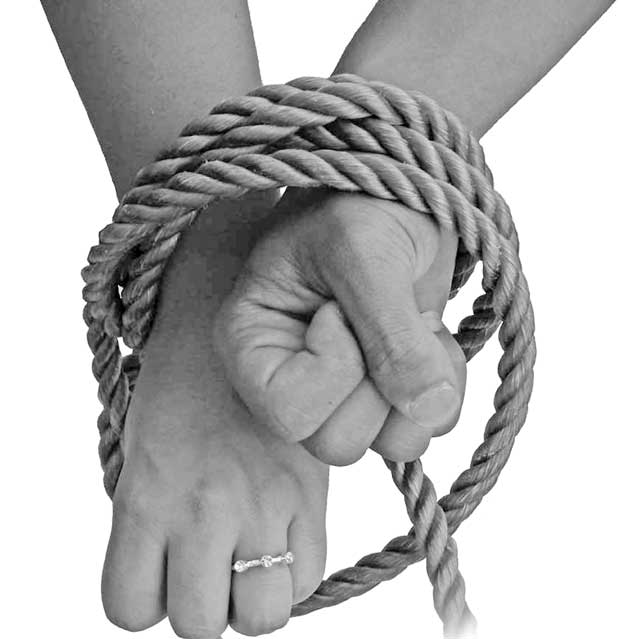Reply To:
Name - Reply Comment
Last Updated : 2024-04-27 00:40:00

Supportive marriages, leading to nurturing environments for families, are the building blocks of our society.
A marriage can represent a safe haven for two people facing the outside world hand in hand. A good marriage is a loving and supportive relationship, built on mutual respect and trust.
However, this wasn’t the reality for Lalani (not her real name), who was forced to marry an abusive  man by her mother. Her husband turned out to be a violent alcoholic, who physically and sexually assaulted her, leaving her with serious injuries.
man by her mother. Her husband turned out to be a violent alcoholic, who physically and sexually assaulted her, leaving her with serious injuries.
The saddest thing about Lalani’s story is its wider significance for all of us as members of Sri Lankan society, because her experience is not exceptional.
Incidences of forced marriage are, by their nature, very difficult to chart and map. They happen behind closed doors, with the - usually female - victim unable to seek help and perhaps unwilling to disobey the wishes of her closest family members. Forced marriage are not a new phenomenon for Sri Lankans, and have in fact been a key part of the recent public discussion around the existing Muslim family law. It is also a priority area of the international community and institutions.
UNICEF commissioned a report, Emerging Concerns and Case Studies on Child Marriage in Sri Lanka, published in 2013, which examines the particularly pernicious form of forced marriage that involves underage girls. This report references the Universal Declaration of Human Rights (UDHR 1948), which specifically refers to the right to enter marriage “with free and full consent” (Article 16 (2).
Just like forced marriage, these laws take away a person’s freedom, privacy and dignity. It strips them of what it is to be a rational and free-thinking human being, and breaches their rights as a citizen. For more information on the laws that target LGBTIQ people, and why we should get rid of them
Meanwhile, the UN’s instrument for protecting and advancing women’s rights globally, The Convention on the Elimination of all forms of Discrimination Against Women (CEDAW), a treaty that Sri Lanka has signed up to, has this to say on forced marriage:
“Traditional attitudes by which women are regarded as subordinate to men or as having stereotyped roles perpetuate widespread practices involving violence or coercion, such as family violence and abuse, forced marriage, dowry deaths, acid attacks and female circumcision. Such prejudices and practices may justify gender-based violence as a form of protection or control of women. The effect of such violence on the physical and mental integrity of women is to deprive them the equal enjoyment, exercise and knowledge of human rights and fundamental freedoms.”
Furthermore, CEDAW’s recent General Recommendation on Equality in Marriage (No. 21) considers early and forced marriages a “harmful” practice that must be eliminated, even if it is approved in local cultures and customs. In ratifying CEDAW and other international treaties, Sri Lanka is bound under international human rights law to harmonize domestic law and policy with treaties. The state must therefore work towards eliminating early and forced marriages.
Incidences of forced marriage are, by their nature, very difficult to chart and map. They happen behind closed doors, with the - usually female - victim unable to seek help and perhaps unwilling to disobey the wishes of her closest family members
Many LGBTIQ people also report varying levels of coercion into unwanted marriages, as their families see marriage as a way to avoid the shame and stigma attached to their child’s sexuality. There is enough anecdotal evidence – particularly from lesbian and bisexual women - to indicate that forced marriage is deployed on an alarmingly regular basis.
Of course, women are at the sharp end of this practice because of the profoundly patriarchal culture we live in, which means that female bodies and lives are at the mercy of the men around them.
Another example involves two 24-year-old women who worked together at a detergent factory. They were arrested by the police on July 19, 2017, following complaints made by their parents and neighbours in their home town. Although they were later released, one of the victims has been set up for a wedding by her parents and was locked in her house, her phone was taken away from her and she was unable to have any outside contact, until the appointed day of marriage. She is a lesbian, who was ‘out’ to her work colleagues at the factory, but she was forced into a marriage.
A pervading and oppressive patriarchal ideology limits women’s free choice and judges them based on their ability to become a wife and mother. We live in a society in which women are pushed to become economically dependent on men and discouraged from skilled or well-paid work other than accepted ‘female professions,’ such as nursing. Given this environment, women become acutely vulnerable to forced marriage.
A pervading and oppressive patriarchal ideology limits women’s free choice and judges them based on their ability to become a wife and mother. We live in a society in which women are pushed to become economically dependent on men and discouraged from skilled or well-paid jobs other than accepted ‘female professions,’ such as nursing
Meanwhile, society’s homophobia and refusal to accept LGBTIQ people as they are, often leads to their inability to see an alternative life for themselves outside conventional marriage. We hear of these artificially contrived heterosexual marriages for LGBTIQ people time and again, and to my knowledge they never end well.
With combined societal homophobia and pressure from a male-dominated society and family unit, it is easy to see how lesbian and bisexual women are uniquely at risk of forced marriage. Sri Lanka is among the 44 countries worldwide that expressly target lesbians with a discriminatory law, criminalising their sexual conduct.
Sections 365 and 365A of the Penal Code, which carried a sentence of up to ten year’s imprisonment, originated as an old British colonial law targeting gay men, which was expanded to cover lesbian relations in 1995. While the existence of these laws does not always mean arrest for lesbian and bisexual women, it is a powerful tool to ensure their silence and compliance. They cannot access justice or protection, and any appeal to the authorities for help extracting themselves from a potential forced marriage is an unsound risk.
This is not to mention the everyday sadness of being locked inside an unhappy marriage to someone you did not choose. Of course, it is likely that if your spouse is unable to make you happy, they are not very happy either.
Just like forced marriage, these laws take away a person’s freedom, privacy and dignity. It strips them of what it is to be a rational and free-thinking human being, and breaches their rights as a citizen. For more information on the laws that target LGBTIQ people, and why we should get rid of them, see my column on March 13, 2017.
The way in which women’s human rights are removed by a combination of the lack of protection they have under the law and their vulnerability to forced marriage is clear to see. The devastating impact of forced marriage is vast and enduring. As Lalani’s account illustrates, the risk of physical and sexual abuse is considerable. Other reported experiences include isolation, unstable family settings for children, self-harm and even suicide.
This is not to mention the everyday sadness of being locked inside an unhappy marriage to someone you did not choose. Of course, it is likely that if your spouse is unable to make you happy, they are not very happy either.
If marriage, relationships and families are the building blocks of our society, we must consider carefully the kind of society we will construct, if those building blocks are rotten.

Add comment
Comments will be edited (grammar, spelling and slang) and authorized at the discretion of Daily Mirror online. The website also has the right not to publish selected comments.
Reply To:
Name - Reply Comment
US authorities are currently reviewing the manifest of every cargo aboard MV
On March 26, a couple arriving from Thailand was arrested with 88 live animal
According to villagers from Naula-Moragolla out of 105 families 80 can afford
Is the situation in Sri Lanka so grim that locals harbour hope that they coul

8 hours ago
26 Apr 2024